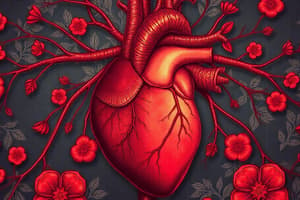Podcast
Questions and Answers
What are the primary functions of blood in the cardiovascular system?
What are the primary functions of blood in the cardiovascular system?
Blood transports nutrients, respiratory gases, hormones, and cellular wastes while providing immune protection and aiding in thermoregulation.
Describe the composition of blood and its two main components.
Describe the composition of blood and its two main components.
Blood is composed of plasma, which makes up 50-60% of total volume, and cellular components, which account for 40-50% and include red blood cells, white blood cells, and platelets.
What characterizes Type A blood in the ABO blood group system?
What characterizes Type A blood in the ABO blood group system?
Type A blood has type A antigens on red blood cells and anti-B antibodies in plasma.
Explain the significance of the Rh factor in blood types.
Explain the significance of the Rh factor in blood types.
What happens when Rh-negative mothers carry Rh-positive babies?
What happens when Rh-negative mothers carry Rh-positive babies?
Differentiate between Type AB and Type O blood.
Differentiate between Type AB and Type O blood.
List the types of cellular components found in blood.
List the types of cellular components found in blood.
What role does plasma play in the blood?
What role does plasma play in the blood?
Flashcards
What is the Cardiovascular System?
What is the Cardiovascular System?
The cardiovascular system is made up of blood vessels, which are responsible for transporting blood throughout the body. Blood plays a crucial role in delivering nutrients and oxygen to organs and tissues, removing waste products, transporting immune cells, and aiding in blood clotting.
What is Blood?
What is Blood?
Blood, a fluid connective tissue, is composed of plasma and cellular components. Plasma, the liquid component, carries ions, proteins, and other substances. The cellular components, including red blood cells, white blood cells, and platelets, perform a variety of functions.
What are Red Blood Cells?
What are Red Blood Cells?
Red blood cells (erythrocytes) are responsible for transporting oxygen throughout the body. They contain hemoglobin, a protein that binds to oxygen and gives blood its red color.
What are White Blood Cells?
What are White Blood Cells?
Signup and view all the flashcards
What are Platelets?
What are Platelets?
Signup and view all the flashcards
What is the ABO Blood System?
What is the ABO Blood System?
Signup and view all the flashcards
What is Type AB Blood?
What is Type AB Blood?
Signup and view all the flashcards
What is Type O Blood?
What is Type O Blood?
Signup and view all the flashcards
Study Notes
Cardiovascular System
- The cardiovascular system circulates blood throughout the body via a network of blood vessels.
- Blood acts as a medium to deliver nutrients and oxygen to organs and tissues, and to remove metabolic waste products.
- Blood also transports immune elements and aids in wound clotting.
Blood Composition
-
Blood is a fluid tissue composed of proteins, ions, and cellular components.
-
Blood is primarily composed of plasma (50-60%) and cellular components (40-50%).
- Plasma is a watery matrix of ions and proteins.
- Cellular components include:
- Red blood cells (erythrocytes): carry oxygen
- White blood cells (leukocytes): part of the immune system
- Platelets (thrombocytes): involved in blood clotting
Blood Functions
- Transports nutrients, respiratory gases, hormones, and cellular waste products.
- Contains immune elements for pathogen defense.
- Maintains body temperature through heat distribution.
ABO Blood Group System
- Type A: Has type A antigens on red blood cells (RBCs) and anti-B antibodies in the plasma.
- Type B: Has type B antigens on RBCs and anti-A antibodies in the plasma.
- Type AB: Has both type A and type B antigens on RBCs and neither anti-A nor anti-B antibodies in the plasma. This is the universal recipient.
- Type O: Has neither type A nor type B antigens on RBCs but has both anti-A and anti-B antibodies in the plasma. This is the universal donor.
Rh Blood Group System
- Rh-positive: Has the Rh factor antigen on RBCs.
- Rh-negative: Does not have the Rh factor antigen on RBCs. Individuals without the Rh factor do not produce anti-Rh antibodies naturally. Anti-Rh antibodies can develop if Rh-negative individuals are exposed to Rh-positive blood.
- Rh incompatibility can be a significant issue during pregnancy, where a Rh-negative mother carrying an Rh-positive child can develop antibodies that can harm the fetus. This phenomenon is especially important for mothers in their first pregnancies.
Blood Type Compatibility
- Blood type compatibility is crucial in emergency situations.
- Compatibility charts can guide blood transfusions, ensuring the safety of patients.
Studying That Suits You
Use AI to generate personalized quizzes and flashcards to suit your learning preferences.




